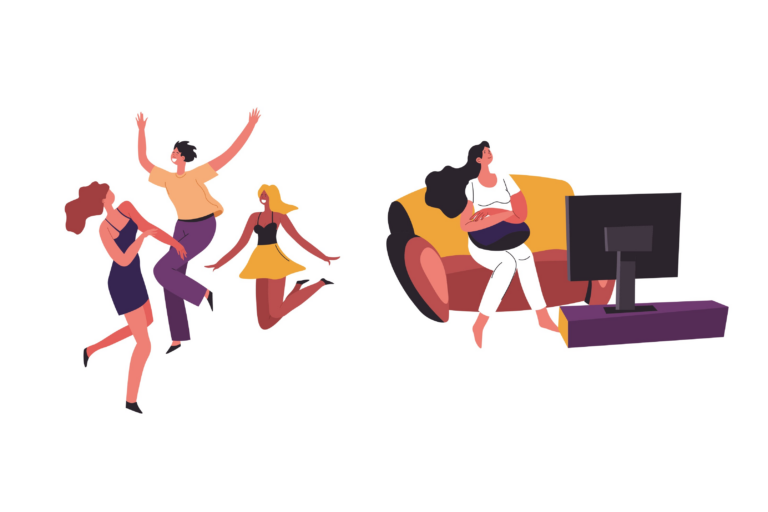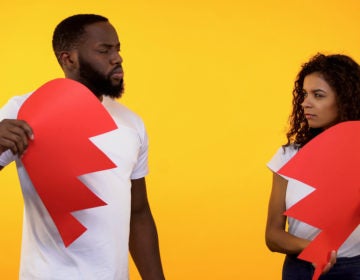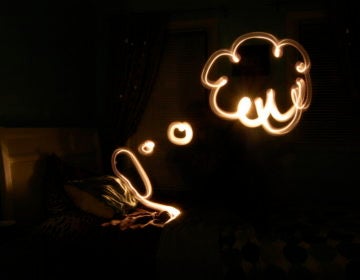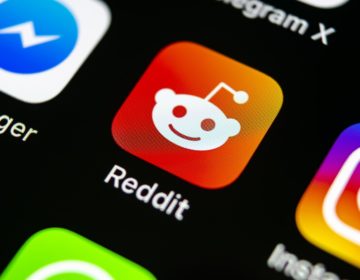Who is the real me, exactly?
Psychologists have a name for that sense of being different when we’re with different groups of friends: our social selves.
Listen 6:36
Psychologists have a name for that sense of being different when we’re with different groups of friends: our social selves. (Sonulkaster / Big Stock Photo)
This story is from The Pulse, a weekly health and science podcast.
Subscribe on Apple Podcasts, Stitcher or wherever you get your podcasts.
Some events are made for our personalities to shine. My favorites are parties. I love watching them on-screen, and I adore getting dressed up to go to them. But I’m terrified of throwing my own parties.
It’s not the logistics that scare me. I know how to prep food, send directions and make a pretty popping playlist. What scares me is the thought of all my friends from so many different phases in my life — high school, college and every random encounter in between — gathering in a room and my having to keep up the same personality I have around each of them.
Growing up, my personality has gone through phases. In high school, I stuck to the books and only my closest friends.
“You’re calm, cool, collected. You know? Very studious,” said Keri, my high school ride-or-die.
In college, I stuck to myself. My friend Bailey can attest to this.
“I would have to forcibly put myself in your door jamb in order for you to speak to me for the first two months of our relationship,” she said.
But by graduate school, I’d come out of my shell more. I partied more, and as my friend Kaitlyn knows, I found it easier to meet new people.
“Any time it was a social thing with our group or we had a smaller social group within our group, you were always in that mix,” she said. “You came and met my roommates, who you didn’t know. I think you knew all of my roommates I lived with in grad school.”
I’ve managed to keep friends from all eras of my life, but I’m still self-conscious about how I act around each of them. If I’m around my high school friends, I feel like I need to be more subdued and strait-laced, like I was in high school. But if I’m around a friend from grad school, I need to stick to a more vibrant, partier personality.
When I scoured the internet, I saw that other people had the exact same concerns.
As AskNikki, an advice columnist on YouTube, says, “Oftentimes, if people are around other people who knew them when they were younger and more immature, they can tend to revert to that because it’s almost like this feeling of, ‘That’s the relationship that they knew with them.’ ‘That’s maybe what they were comfortable with then.’ Or sometimes this feeling of, ‘That’s how I have to act around them.’”
Psychologists have a name for this: social selves.
“I think of social selves as the idea that we sort of unconsciously but naturally present different sides of ourselves or have different experiences of ourselves depending on the person or the group that we’re interacting with,” said psychologist Michael Wiederman, of the University of Alabama, Birmingham.
Subscribe to The Pulse
“You know, in our own head, we have this sort of consistent sense of self — that ‘I am who I am regardless,’ and I may not be aware that ultimately, though, each person or group that I’m interacting with is probably experiencing different aspects of me, not the entire package,” Wiederman said.
Our social selves are twofold. We make our own social selves, creating them during each interaction as a way of displaying the personality we want to have, matching the mood of whoever we’re in contact with, or matching the energy that the other person is looking for. Everyone we interact with creates a social self for us, as well: an understanding of our personality, filtered through their own judgment, desires and mood.
“If I ask five friends to rate me at different personality characteristics, they’ve seen different sides of me,” Wiederman said. “Each of their experiences have also been filtered through their personality and their expectations. And so even if these five friends have had all exactly the same interactions with me, we’ve never done anything apart, they’ve always watched everything that I do and so forth, they have their own sort of stories built up around who I am, based on their first impressions of me.”
‘The real me?’ Who is that anyway?
So having a personality that comes across differently to each friend is actually completely fine. Then why am I afraid to bring everyone together in one place – at one party? Why am I always worried about who the “real me” is?
“I think it’s this need to be accepted by others,” said therapist and counselor Funto Oyewole. “There’s this notion that if you’re ‘real,’ people accept you more. You have a higher social value if you come up as ‘real’ and ‘woke’ and all that stuff. But what does that really mean? And I think it might mean different things to different people.”
Oyewole said that being “real” is not what we think it is.
“The truth is, we actually have no control over what other people think of us. We can’t change their point of view,” Oyewole said. “We might be able to influence it with the way we act, but changing it is solely up to them.”
Oyewole said if we’re concerned about how our friends perceive us — something we cannot change — it might be time to reassess what our values are.
“Values are kind of, like, those qualities about you that matter to you,” Oyewole said. “So, qualities that you want to stand up for, qualities that are important to you, that give your life a sense of meaning, and not because your parents think they should be important, not because friends think they should be important, but what is important to you as a person.”
We’re always going to have multiple sides to our personalities, sometimes competing. The most important part is that our personalities, shifty and complicated as they may be, reflect what we value.
I may be more subdued and chill around my high school friends because that’s what I value in our relationship: We could have the greatest day ever doing practically nothing at all. With my grad school friends, I may tend to be louder and want to party a lot, but that’s because with them, I value how we all have this mutual hunger for new experiences.
Social distancing means I won’t be throwing a party anytime soon, sorry. But when I do, I don’t think I’ll be as worried anymore.
WHYY is your source for fact-based, in-depth journalism and information. As a nonprofit organization, we rely on financial support from readers like you. Please give today.






